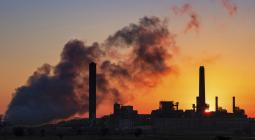Coal Knew, Too
A newly unearthed journal from 1966 shows the coal industry, like the oil industry, was long aware of the threat of climate change.
“Exxon knew.” Thanks to the work of activists and journalists, those two words have rocked the politics of climate change in recent years, as investigations revealed the extent to which giants like Exxon Mobil and Shell were aware of the danger of rising greenhouse gas emissions even as they undermined the work of scientists.
But the coal industry knew, too — as early as 1966, a newly unearthed journal shows.
In August, Chris Cherry, a professor in the Department of Civil and Environmental Engineering at the University of Tennessee, Knoxville, salvaged a large volume from a stack of vintage journals that a fellow faculty member was about to toss out. He was drawn to a 1966 copy of the industry publication Mining Congress Journal; his father-in-law had been in the industry and he thought it might be an interesting memento.
Cherry flipped it open to a passage from James R. Garvey, who was the president of Bituminous Coal Research Inc., a now-defunct coal mining and processing research organization.
“There is evidence that the amount of carbon dioxide in the earth’s atmosphere is increasing rapidly as a result of the combustion of fossil fuels,” wrote Garvey. “If the future rate of increase continues as it is at the present, it has been predicted that, because the CO2 envelope reduces radiation, the temperature of the earth’s atmosphere will increase and that vast changes in the climates of the earth will result.”
“Such changes in temperature will cause melting of the polar icecaps, which, in turn, would result in the inundation of many coastal cities, including New York and London,” he continued.
Cherry was floored.
“It pretty well described a version of what we know today as climate change,” said Cherry. “Increases in average air temperatures, melting of polar ice caps, rising of sea levels. It’s all in there.”
In a discussion piece immediately following Garvey’s article, Peabody Coal combustion engineer James R. Jones noted that the coal industry was merely “buying time” before more air pollution regulations came into effect. “We are in favor of cleaning up our air,” he wrote. “Everyone can point to examples in his own community where something should be done. Our aim is to have control that does not precede the technical knowledge for compliance.”
Climate change is not Cherry’s area of study, but he was struck by how the tone of the articles differed from the way many fossil fuel companies talk about climate change today. Rather than engage in denial, the articles offered a fairly straightforward acknowledgment of the emerging science. (This reporter is also a writer for UT’s Tickle College of Engineering, where Cherry teaches.)
As Cherry did some of his own digging, he soon realized his discovery could be the first evidence that the coal industry was aware of the impending climate crisis more than half a century ago — a finding that could open mining companies to the type of litigation that the oil industry is now facing.
Decades Of Denial
While Peabody Energy, the largest private-sector coal company in the world and the largest producer of coal in the U.S., now acknowledges climate change on its website, it has been directly and indirectly involved in obfuscating climate science for decades. It funded dozens of trade, lobbying and front groups that peddled climate misinformation, as The Guardian reported in 2016.
As recently as 2015, Peabody Energy argued that carbon dioxide was a “benign gas essential for all life.”
Increases in average air temperatures, melting of polar ice caps, rising of sea levels. It’s all in there.Chris Cherry, a professor at the University of Tennessee, Knoxville
“While the benefits of carbon dioxide are proven, the alleged risks of climate change are contrary to observed data, are based on admitted speculation, and lack adequate scientific basis,” the company wrote in a letter that year to the White House Council on Environmental Quality.
At the heart of big coal’s denial campaign was Fred Palmer, who served as Peabody’s senior vice president of government relations from 2001 to 2015. In 1997, Palmer founded the Greening Earth Society, a now-defunct industry front group that argued that burning fossil fuels was good for the planet. The group was based in the same office as the Western Fuels Association, a consortium of coal suppliers and coal-fired utilities that Palmer also ran.
“Every time you turn your car on and you burn fossil fuels and you put CO2 into the air, you’re doing the work of the Lord,” Palmer told a Danish documentary team in 1997. “That’s the ecological system we live in.”
Asked for comment, a Peabody spokesperson told HuffPost: “Peabody recognizes that climate change is occurring and that human activity, including the use of fossil fuels, contributes to greenhouse gas emissions. We also recognize that coal is essential to affordable, reliable energy and will continue to play a significant role in the global energy mix for the foreseeable future. Peabody views technology as vital to advancing global climate change solutions, and the company supports advanced coal technologies to drive continuous improvement toward the ultimate goal of near-zero emissions from coal.”
Palmer, who did not respond to HuffPost’s request for comment, continues to carry the torch. He now works as an energy policy adviser to The Heartland Institute, a Chicago-based think tank whose climate denial is so severe that even Exxon Mobil abandoned funding it and its climate denial efforts a decade ago. In 2011, leaked memos showed that the institute paid contrarian scientists like Craig Idso, founder of the Center for the Study of Carbon Dioxide and Global Change, $11,600 a month to promote carbon dioxide as beneficial to the environment.
The group sits at the heart of a broader right-wing misinformation network funded in large part by hedge fund billionaire Robert Mercer and his daughter, Rebekah, both Republican mega-donors who backed President Donald Trump and financed projects such as Breitbart News and Cambridge Analytica, the data firm considered key to Trump’s 2016 win. Palmer’s daughter, Downey Magallanes, was a top policy adviser at Trump’s Interior Department before joining oil giant BP in September 2018.
All of this was taking place well after climate change had become a commonly understood idea in the scientific community. A 1965 report from President Lyndon Johnson’s Science Advisory Committee was the first from the White House to address climate change (and is likely what precipitated the Mining Congress Journal article). “The climate changes that may be produced by the increased CO2 content could be deleterious from the point of view of human beings,” it warned. In 1988, NASA scientist James Hansen testified to Congress about what was then known as the “greenhouse effect.” And in 1992, the United Nations established the Framework Convention on Climate Change, an international treaty to begin addressing the problem.
But as this consensus emerged, so too did a wave of industry-funded climate denial via vast, shadowy networks of front groups, public relations campaigns and scientists for hire.
Pulling Back The Curtain
In 2015, journalists at InsideClimate News, the Los Angeles Times and Columbia University exposed internal Exxon Mobil documents showing that the company’s scientists had a deep understanding of climate change even as Exxon worked publicly to downplay that science.
Twenty state attorneys general launched an “Exxon Knew” campaign, which eventually led to communities across the country filing at least 14 legal challenges against Exxon and other fossil fuel companies. One lawsuit, from the New York state attorney general’s office, went to trial on Oct. 22 and focuses on how the company accounted for the costs of potential future regulations on climate change. The Massachusetts attorney general filed another suit on Oct. 24, this time claiming the company had engaged in deceptive advertising and misled investors about the systemic financial risks to its business posed by fossil fuel-driven climate change. Earlier this month, two of Hawaii’s biggest municipalities sued Exxon and other big oil companies to recoup the costs of adapting to rising seas and more violent storms.
Evidence of what fossil fuel companies knew about climate change and when is critical to the legal strategy of those seeking damages for carbon dioxide emissions. If fossil fuel companies were aware of their products’ harmful effects on the planet, they could be held liable for damages.
They fought the hardest because they had the biggest existential threat.Kert Davies, founder and director of the Climate Investigations Center
Legal liability boils down to four factors, said David Bookbinder, chief counsel for the Niskanen Center, which is representing counties in Colorado that have filed suit: one, whether the defendants knew that their products would cause climate change; two, what they told or did not tell the public about the consequences of using their products; three, the extent of injuries caused by climate change; and four, whether the defendants’ actions have led to a portion of those injuries. What the plaintiffs in these suits can prove remains to be seen.
What we do know is that coal, when burned, has by far the biggest climate footprint of any fossil fuel, producing more carbon dioxide per unit than oil or gas. In the U.S. alone, coal produced 65% of the power sector’s planet-warming emissions. The 1966 article in the Mining Congress Journal certainly raises questions about what the coal industry knew at the time.
Robert Brulle, a professor emeritus of sociology and environmental science at Drexel University, authored a recent paper that suggests the coal industry must have known quite a bit, given how prominently it positioned itself in the climate denial movement.
Brulle researched 12 major groups and coalitions that argued against mandatory regulation of carbon dioxide from 1989 to 2015 — which he calls the “climate change countermovement.” That countermovement included 2,000 different businesses, political or social groups, as well as other organizations, but Brulle found that 179 core organizations belonged to multiple coalitions. Coal companies and predominantly coal-burning utilities were the most prevalent. He describes oil and gas companies as “more of a marginal player” by comparison.
“The coal mining industry — the utilities that were burning it for electricity, along with the railroads who were hauling it — and manufacturing industries like steel were the first corporate forces to become climate deniers and try to block action on climate policy,” said Kert Davies, founder and director of the Climate Investigations Center. “They fought the hardest because they had the biggest existential threat.”
Where Do We Go From Here?
In the aftermath of the 1973 oil embargo, Exxon and other oil giants leased large parcels of land for coal mining with the goal of manufacturing synthetic fuels and lowering U.S. dependence on the Middle East.
Some previously released documents show that Exxon’s scientists began advising that the world phase out coal as a fuel as early as 1979. In one scenario, the Exxon scientists concluded that non-fossil fuels would need to be substituted for coal beginning in the 1990s to keep carbon dioxide levels below atmospheric concentrations of 440 parts per million. In 1999, Exxon merged with Mobil, and by 2002, Exxon Mobil had dumped its coal assets.
Meanwhile, the coal industry tried to reinvent itself with the concept of “clean coal.” This as-yet-undelivered promise that carbon capture and other technological advances could lower coal’s environmental impact has been around for decades but resurged in the early 2000s as regulations seemed imminent.
The biggest proponent of this idea was the American Coalition for Clean Coal Electricity, a coal front group that spent $35 million on public relations campaigns in 2008 alone, seeking to influence the election. A year later, ACCCE was caught sending Congress fraudulent letters opposing federal climate legislation and pretending to be from veterans, women’s and civil rights groups. The incident led many members to leave the organization, but Peabody remains a member to this day.
“Its whole mission was to stop climate regulations but pretend that they were in favor of clean coal, which, of course, doesn’t exist,” said Davies.
Peabody Energy filed for bankruptcy protection in 2016, the same year carbon dioxide levels hit 400 parts per million. Eight other coal companies have filed for bankruptcy this year. Even as the Trump administration has promised a coal resurgence and rolled back Obama-era regulations, the industry’s profitability continues to experience a downward slide. If the slogan “Coal Knew” ever does take off, it’s unclear who’ll be left to sue.
22 November 2019
Huffpost




